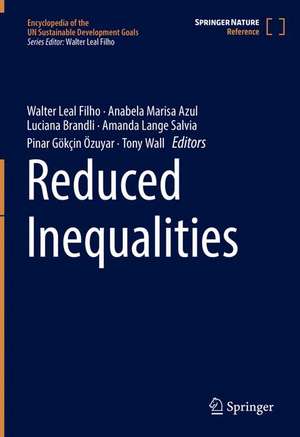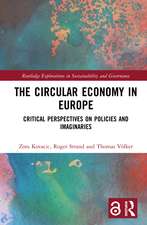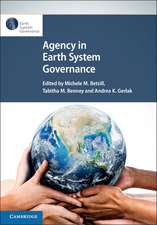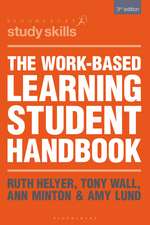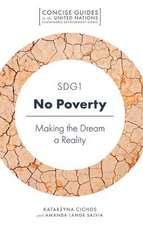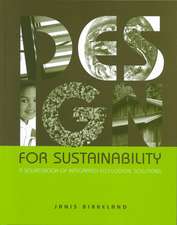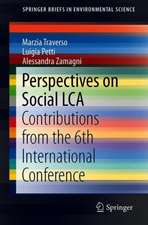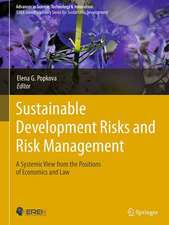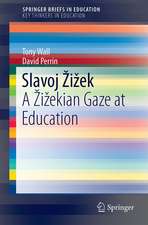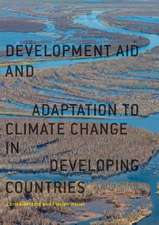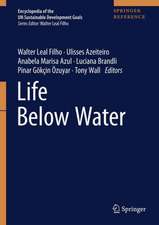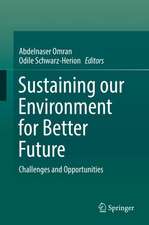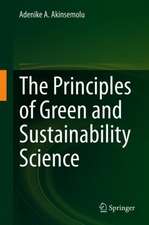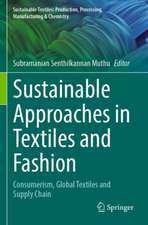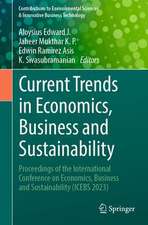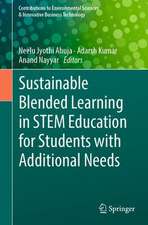Reduced Inequalities: Encyclopedia of the UN Sustainable Development Goals
Editat de Walter Leal Filho, Anabela Marisa Azul, Luciana Brandli, Amanda Lange Salvia, Pinar Gökcin Özuyar, Tony Wallen Limba Engleză Hardback – 31 aug 2021
The problems related to the process of industrialisation such as biodiversity depletion, climate change and a worsening of health and living conditions, especially but not only in developing countries, intensify. Therefore, there is an increasing need to search for integrated solutions to make development more sustainable. The United Nations has acknowledged the problem and approved the “2030 Agenda for Sustainable Development”. On 1st January 2016, the 17 Sustainable Development Goals (SDGs) of the Agenda officially came into force. These goals cover the three dimensions of sustainable development: economic growth, social inclusion and environmental protection.
- Progressively achieve and sustain income growth of the bottom 40 per cent of the population at a rate higher than the national average
- Empower and promote the social, economic and political inclusion of all, irrespective of age, sex, disability, race, ethnicity, origin, religion or economic or other status
- Ensure equal opportunity and reduce inequalities of outcome, including by eliminating discriminatory laws, policies and practices and promoting appropriate legislation, policies and action in this regard
- Adopt policies, especially fiscal, wage and social protection policies, and progressively achieve greater equality
- Improve the regulation and monitoring of global financial markets and institutions and strengthen the implementation of such regulations
- Ensure enhanced representation and voice for developing countries in decision-making in global international economic and financial institutions in order to deliver more effective, credible, accountable and legitimate institutions
- Facilitate orderly, safe, regular and responsible migration and mobility of people, including through the implementation of planned and well-managed migration policies
- Implement the principle of special and differential treatment for developing countries, in particular least developed countries, in accordance with World Trade Organization agreements
- Encourage official development assistance and financial flows, including foreign direct investment, to states where the need is greatest, in particular least developed countries, African countries, small island developing states and landlocked developing countries, in accordance with their national plans and programmes
- Reduce to less than 3 per cent the transaction costs of migrant remittances and eliminate remittance corridors with costs higher than 5 per cent
Editorial Board
Md. Mahmudul Alam, Olga Bialostocka, José Baltazar Salgueirinho Osório de Andrade Guerra, Narasimha Reddy Donthi, Ulla A. Saari, Daniele Vieira, Amanda Lange Salvia
Din seria Encyclopedia of the UN Sustainable Development Goals
- 18%
 Preț: 3893.48 lei
Preț: 3893.48 lei - 18%
 Preț: 3610.14 lei
Preț: 3610.14 lei - 18%
 Preț: 3367.85 lei
Preț: 3367.85 lei - 18%
 Preț: 3882.42 lei
Preț: 3882.42 lei - 18%
 Preț: 3896.62 lei
Preț: 3896.62 lei - 18%
 Preț: 3880.85 lei
Preț: 3880.85 lei - 18%
 Preț: 3352.06 lei
Preț: 3352.06 lei - 24%
 Preț: 3402.30 lei
Preț: 3402.30 lei - 18%
 Preț: 3359.96 lei
Preț: 3359.96 lei - 24%
 Preț: 2926.08 lei
Preț: 2926.08 lei - 18%
 Preț: 3408.87 lei
Preț: 3408.87 lei - 18%
 Preț: 3404.14 lei
Preț: 3404.14 lei - 18%
 Preț: 3413.60 lei
Preț: 3413.60 lei - 18%
 Preț: 3404.14 lei
Preț: 3404.14 lei - 24%
 Preț: 2427.06 lei
Preț: 2427.06 lei - 24%
 Preț: 2915.07 lei
Preț: 2915.07 lei
Preț: 3344.20 lei
Preț vechi: 4078.29 lei
-18% Nou
Puncte Express: 5016
Preț estimativ în valută:
639.99€ • 694.93$ • 537.59£
639.99€ • 694.93$ • 537.59£
Carte disponibilă
Livrare economică 01-15 aprilie
Preluare comenzi: 021 569.72.76
Specificații
ISBN-13: 9783319958811
ISBN-10: 331995881X
Pagini: 924
Ilustrații: XXIV, 924 p. 85 illus., 14 illus. in color.
Dimensiuni: 178 x 254 mm
Greutate: 2.09 kg
Ediția:1st ed. 2021
Editura: Springer International Publishing
Colecția Springer
Seria Encyclopedia of the UN Sustainable Development Goals
Locul publicării:Cham, Switzerland
ISBN-10: 331995881X
Pagini: 924
Ilustrații: XXIV, 924 p. 85 illus., 14 illus. in color.
Dimensiuni: 178 x 254 mm
Greutate: 2.09 kg
Ediția:1st ed. 2021
Editura: Springer International Publishing
Colecția Springer
Seria Encyclopedia of the UN Sustainable Development Goals
Locul publicării:Cham, Switzerland
Cuprins
Access to Higher Education.- Accessibility as a Precondition for Equality for Persons with Disabilities.- Addressing Inequality through an Integral Design Approach for Sustainable Development in Rural Communities.- Ageism: Conceptualizing and Contrasting Age-Related Discrimination.- Contribution of Fair Trade in Sustainable Development.- Cultural Diversity and Implications in Social Environment.- Cultural Inequality and Sustainable Development.- Development and Equality: UN’s Effort with Least Developed Countries (LDC).- Digital Divide: From a Peripheral to a Core Issue for all SDGs.- Dimensions and Causes of Systemic Oppression.- Diminishing Inequality through Coaching in Education.- Discrimination: Concept, Types, Impact, and Remedies.- Economic Inequality: Measures and Causes.- Economic Policy to Reduce Inequality.- Effects of Trade Barriers on Development and Growth.- Empowerment of Civil Society.- Enhancing Collaboration Between Societal Stakeholders for Reduced Inequalities.- Equal Resilience for Global Risks: Mitigating Social, Economic and Environmental Inequalities.- Equality, non-discrimination, and sustainable development of persons with disabilities.
Notă biografică
Walter Leal Filho (BSc, PhD, DSc, DPhil, DEd, DL, DLitt) is a Senior Professor and Head of the Research and Transfer Centre "Sustainable Development and Climate Change Management” at Hamburg University of Applied Sciences in Germany, and Chair of Environment and Technology at Manchester Metropolitan University, UK. He is the initiator of the Word Sustainable Development Symposia (WSSD-U) series, and chairs the Inter-University Sustainable Development Research Programme. Professor Leal Filho has written, co-written, edited or co-edited more than 400 publications, including books, book chapters and papers in refereed journals.
Anabela Marisa Azul is a Researcher at the Center for Neuroscience and Cell Biology (CNC) and the Institute for Interdisciplinary Research of the University of Coimbra (UC, Portugal). She holds a Ph.D. in Biological Sciences, specializing in Ecology (2002, UC), and pursued her investigation on biology and ecology of fungi to pinpoint the role of mycorrhizal symbiosis for sustainability of Mediterranean forests under different land use scenarios at the Centre for Functional Ecology (CFE-UC), where she became an Associate Researcher (from 2009 to 2014). At CFE-UC, Marisa Azul developed a holistic approach that combined innovation in food production with sustainable development and public scientific awareness to multiple actors. At CNC, from 2014 on, Marisa Azul focuses her investigation on basic research and participatory research dynamics to pinpoint links between metabolism, health/disease, and sustainability. She has broad academic experience as a researcher working in participatory research and interdisciplinary that link biomedical and life/environmental sciences, social sciences, science education, science communication, and artistic forms. Her research interests also lie in bringing together the academy and social/economical players. She has been successful in attracting national and international funding, coordinating projects, and mentoring young researchers on the topics mentioned. She has co-authored over 40 scientific publications and book chapters, co-edited 4 books on Climate Change Management Series and 1 onWorld Sustainability Series published by Springer, co-authored 4 books for children and 2 comics, and co-produced 1 animation.
Anabela Marisa Azul is a Researcher at the Center for Neuroscience and Cell Biology (CNC) and the Institute for Interdisciplinary Research of the University of Coimbra (UC, Portugal). She holds a Ph.D. in Biological Sciences, specializing in Ecology (2002, UC), and pursued her investigation on biology and ecology of fungi to pinpoint the role of mycorrhizal symbiosis for sustainability of Mediterranean forests under different land use scenarios at the Centre for Functional Ecology (CFE-UC), where she became an Associate Researcher (from 2009 to 2014). At CFE-UC, Marisa Azul developed a holistic approach that combined innovation in food production with sustainable development and public scientific awareness to multiple actors. At CNC, from 2014 on, Marisa Azul focuses her investigation on basic research and participatory research dynamics to pinpoint links between metabolism, health/disease, and sustainability. She has broad academic experience as a researcher working in participatory research and interdisciplinary that link biomedical and life/environmental sciences, social sciences, science education, science communication, and artistic forms. Her research interests also lie in bringing together the academy and social/economical players. She has been successful in attracting national and international funding, coordinating projects, and mentoring young researchers on the topics mentioned. She has co-authored over 40 scientific publications and book chapters, co-edited 4 books on Climate Change Management Series and 1 onWorld Sustainability Series published by Springer, co-authored 4 books for children and 2 comics, and co-produced 1 animation.
Luciana Brandli, Ph.D., is an Associate Professor in the University of Passo Fundo, Brazil, working in the Ph.D. Program in Civil and Environment Engineering. Her current research interests include sustainability in higher education and green campus, management of urban infrastructure and sustainable cities, and the Agenda 2030 for sustainable development. She supervises a number of Master’s and Doctoral students on engineering and environment and sustainability issues and has in excess of 300 publications, including books, book chapters, and papers in refereed journals.
Amanda Lange Salvia has a degree in Environmental Engineering from the University of Passo Fundo, Brazil, and graduate studies focused on sustainable cities and universities. Her work focuses on the Sustainable Development Goals, the role of universities towards sustainability and the impacts of climate change. Amanda has experience with international studies assessing aspects related to the 2030 Agenda and sustainability in higher education. She is reviewer of various journals and is also a member of the editorial board of the International Journal of Sustainability in Higher Education.
Pinar Gökçin Özuyar is a Faculty Member of Faculty of Economics, Administrative and Social Sciences at Istinye University, Istanbul, Turkey. She received her B.S. degree in Environmental Engineering from Istanbul Technical University in 1992 and M.S. and Ph.D. degrees from Bogazici
University Institute of Environmental Sciences, Istanbul, Turkey. Her Ph.D. thesis was based on the “Thermodynamic Analysis of Treatment Plants for Producing Energy from SolidWaste” which she conducted in Germany with a joint scholarship from Forschungzentrum Jülich and TUBITAK (National
Science Foundation of Turkey). Defining herself as a pracademic, she has more than 25 years of experience not only in academia but also in the private sector working on environment and sector-specific activities in Turkey and Dubai (UAE). She has extensive expertise specifically in environmental auditing according to World Bank Standards which is required for international financing especially during company mergers and acquisitions (M&As) and greenfield projects. Working over the years in projects involving different stakeholder groups with different priorities, she has the proven capacity for establishing a dialogue between such stakeholder groups. Although coming from a technical background, her academic work focuses on involving sustainable development intothe strategies
of corporations including higher academic institutions. Currently, she teaches and leads funded research on sustainability/sustainable development especially focusing on industrial ecology and regional development.
Tony Wall (BSc Hons, PGDip, PGCHE, MA, MSc, EdD, MCIPD, NTFHEA) is a Professor, Founder and Director of the International Thriving at Work Research Group in the United Kingdom where he is the institutional lead for the Inter-University Sustainable Development Research Programme. His research impact work has won multiple Santander International Research Excellence Awards and a National Fellowship of the Higher Education Academy. Apart from being a visiting scholar in the US and Australia, his change work includes co-founding of the Washington Ethical Leadership Summit and the TS Eliot Foundation’s International Creative Practice for Wellbeing Framework.
Caracteristici
Fosters knowledge to support the UN Sustainable Development Goal to reduce inequality within and among countries Comprehensively describes research, projects and practical action Provides government agencies, education institutions and non-governmental agencies with a sound basis to promote sustainability efforts Covers many countries, very international
